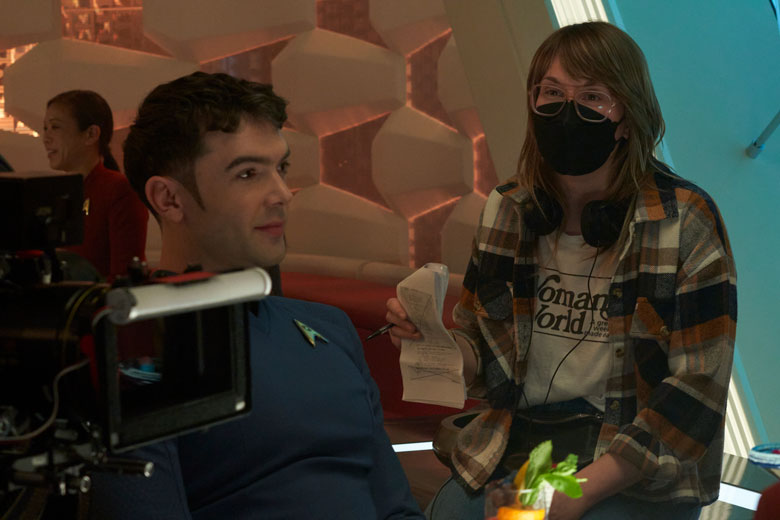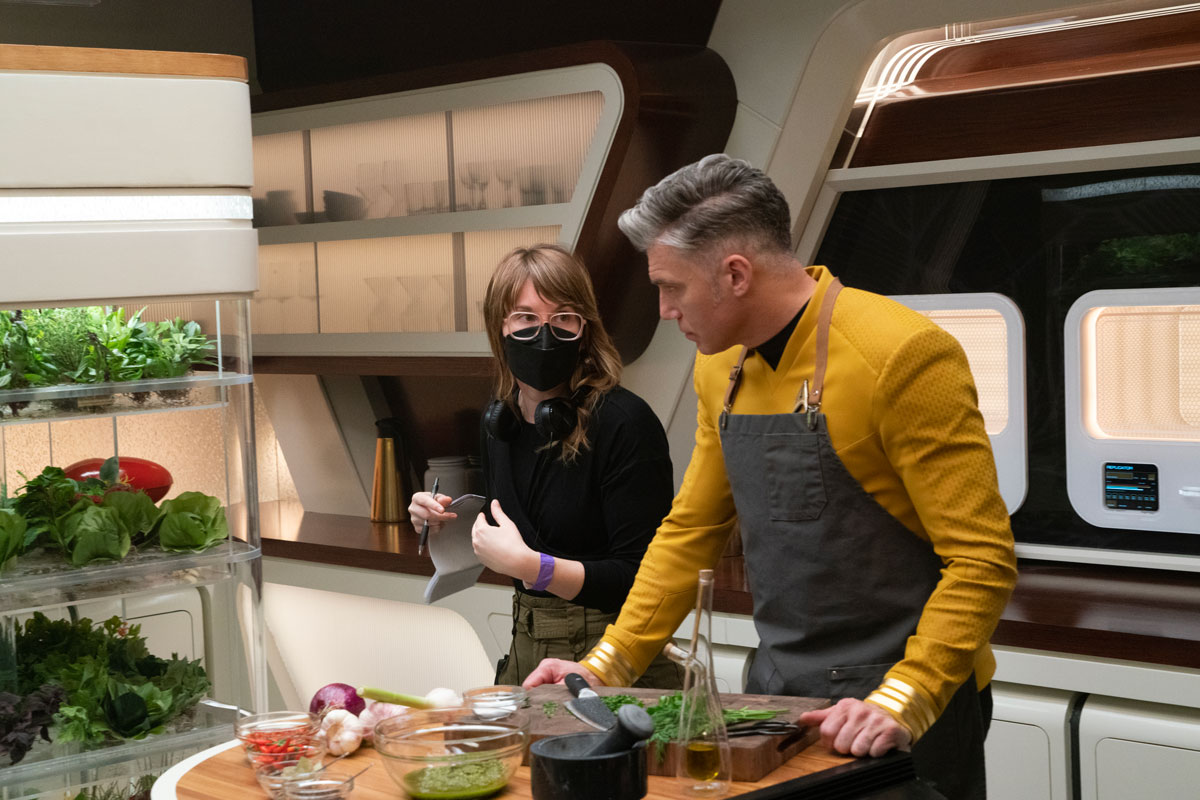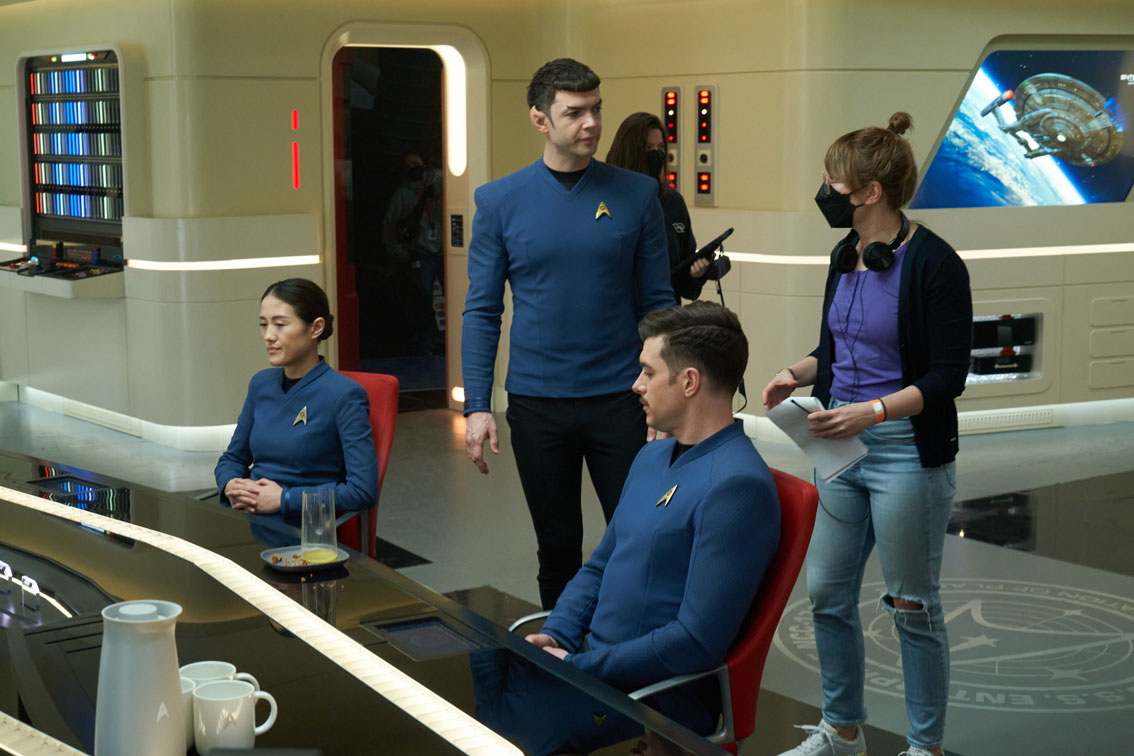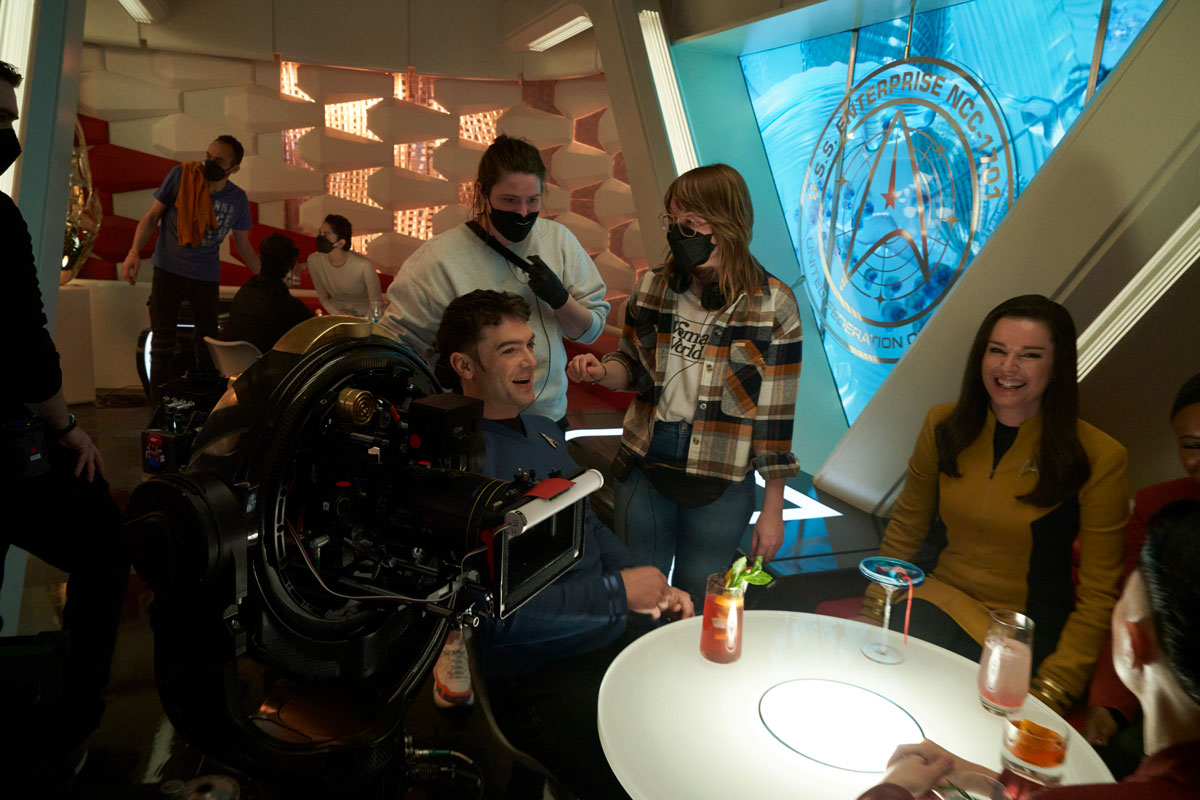Last week, we spoke to Star Trek: Strange New Worlds actors Jess Bush and Gia Sandhu about Christine Chapel and T’Pring’s experiences in last week’s “Charades” — and today, we’ve got another conversation to share about the season’s midway-point episode.
We had the opportunity to chat with “Charades” director Jordan Canning — whose other work includes episodes of Schitt’s Creek and the HBO revival of Fraggle Rock — about navigating humor during Vulcan family drama, filming on the revolutionary AR wall stage, and more.
https://www.instagram.com/p/CupBJFlAeCo/?hl=en
TREKCORE: You’ve directed a wide range of film and television, but this is your first visit to Star Trek. Did you have much familiarity with Trek before coming into Strange New Worlds?
JORDAN CANNING: I was a big Next Generation fan when I was a kid — I watched that nightly with my parents — and I was a big fan of Star Trek IV; I watched The Voyage Home so many times. And, I mean, it’s the comedy film, you know? So I’m not surprised that fate led me to this episode of Star Trek thirty years later.
I’m not the world’s deepest Star Trek expert by any means. My dad was a big Star Trek fan — the original show — he watched tons of that, and then we all watched Next Gen together, but then I kind of didn’t keep following it. I didn’t get into Deep Space Nine and everything, but now I’m like, “Oh, I should go back and watch all of them.” I rewatched all the movies leading up to doing the job and was like, “Oh, these are great.”
I mean, there’s a couple that are better than others, but, I mean, lots of them are so good. And man, Voyage Home holds up.
TREKCORE: We know that Star Trek can do comedy, and this wonderful episode keeps that alive. As the person in charge on the set, how do you set the tone in the workplace? How do you set the mood for comedy?
CANNING: I don’t know if I have any tricks of the trade; I just love being on set. I have so much fun when I’m shooting, and I think I’m kind of just a natural sort of goofy, silly, funny person. And so I try to just impart that on my sets and just, you know, it’s the best job ever!
We’re having so much fun. We’re doing such silly, amazing stuff, so let’s just enjoy it. Obviously, things get stressful and there are days where you’re like, “How are we ever gonna make it through this?” But at the end of the day, we’re making fun TV.
I’ve worked on sets where those dark clouds come over, and it just sort of ruins everything. There’s hundreds of people there working. So many different personalities, and you do just have to kind of find a way to make it fun and rally everyone and be like, “Okay, yes, we’re three hours behind, but guys, it’s gonna be great. Watch this.”

TREKCORE: When you’re working with the actors, is it a collaboration of that tone? How does that back and forth work to get it to be the funniest it could be?
CANNING: Well, I think what’s so awesome about this episode is everybody gets to show how funny they are. Obviously, it’s a big Spock and Chapel episode, but everybody kind of gets at least a little moment or a little fun reaction. I love the montage where everybody’s kicking in to help. Like when you have the four women standing up trying to teach Spock how to talk like a Vulcan? I love that, they were so funny. They had all of these great ideas.
To me, that’s always the best way to approach comedies. Like, you’ve got a great script. You’ve got the jokes in there, but then let’s see what the actors wanna do. And, you know, maybe they have a little instinct to do something, and you pick up on it and you go, “Oh my God, you had this great little moment or you threw this little line in. Let’s keep that. That was funny.” Or to keep that line and then add this little move to it.
And you build upon it because I’ve got to see it to know exactly if it’s funny or if it’s working. With the scenes with Spock, Ethan [Peck] and I were both very determined to make sure that he never went too erratic — it always had to feel like it was coming from Spock, you know? Not turned into something too broad, and then suddenly you’re like, “Who is this? This is not Spock.” So sometimes you’d see it, and I’d be like, “Okay, Ethan, that was too big. Let’s dial it back,” or “Actually, you know what? I think you can go even bigger. Try, you know, try going like really wild with this.” And then he would go for it and I’d be like, “There, that’s it. That’s great.”
Having the time to play on set and actors who are willing to play around? I mean, everybody. There’s so many great little improvised moments in this episode that I don’t think anyone would realize were improvised. Pike had a ton of great, even just great looks. Pike had so many funny reactions.

TREKCORE: Every time you cut to a Pike reaction was just guaranteed laugh out loud.
CANNING: It’s always gold. And he would throw little lines in there, like the little line about the hat. When Spock is like, “No, these are regulation.” And Pike goes, “…Yeah, I have one just like it.” That was improvised.
La’an had a great line, when they’re doing the Spock thing, you know, “Do I really sound like that?” “Yep, yeah. Oh, absolutely.” Just that little button, you know, it just elevates things, in comedy to have that little sparkle on it. Everybody just crushed it.
We even had this scene — it didn’t make it in the cut — but we were having so much fun on set. We were in the bar set and we had a little extra time, remarkably, and Ethan and Rebecca had, like, worked out this thing. They were like, “Okay, can we just try this where, like, I’ve got gum, and Spock wants to try the gum and doesn’t understand what gum is for? And I was like, “Okay, great. Set up the camera.”
The two of them, tthey did this whole routine where he tries gum and he’s like, “Oh, maybe I should try nuts with it.” And they’re like, “No, no.” And then he is like, “How about a pickle?” [laughs] It’s just, I mean, it was so silly and funny. Just finding ways for us to see Spock experiencing the world through human eyes and the foibles around that.
TREKCORE: And finding the moments of funny that aren’t in the script. It sounds like you had leeway for things like that?
CANNING: Yeah. Kathryn Lyn who wrote the script with Henry [Alonso Meyers] was always on the set. I love Kathryn, we had so much fun. And so there was always someone there, you know, so it would be like, “This isn’t quite working. Can we try this?” And she’d be like, “Great. How bout this?” Or “Do you like this improv? Great. I’m gonna get them to keep doing that.” So it was great to have her there to bounce ideas off of.

TREKCORE: There were also some really heartfelt moments in there and there were subtle changes in the way that you filmed those scenes. I specifically think it’s so lovely the way you filmed the scenes with Spock and his mother, much softer and slower paced. How do you balance those things in an episode like this? How do you switch tones and have it blend so nicely?
CANNING: I think what’s so great about comedy and especially a script like this, which has a lot of pace to it, you know, the engine sort of starts, and then you’re going, going, going, and there’s fun. There’s montages. There’s comedy. And so when the audience is sort of on board with that, you can really take advantage of those moments where you do slow it down and you do sit in an emotional moment or a moment of silence or a little tension…
TREKCORE: A moment to breathe.
CANNING: Yeah, a moment to breathe — because that’s how you recognize that there’s a little change and those are satisfying because comedy clips along, and then it allows you to sort of frame up a beautiful moment of emotion and connection amidst that sort of fun paced-up episode.
I love the scene — in the bathroom with Chapel and Spock — it’s one of my favorite scenes. It gets me every time. It’s so beautiful. And, you know, they did such a gorgeous job of just those little subtle moments and her decision to zap. It breaks my heart every time. These two, this missed opportunity, this letting go of this potential way to connect with Spock, because she knows that the greater good is getting him back to the way he was and knowing that that means probably losing him. It’s a beautiful moment.
TREKCORE: It really is. And also her heartfelt declaration of her feelings.
CANNING: Oh, I know. To the aliens.

TREKCORE: How challenging was that scene to film on the AR wall stage?
CANNING: She was just talking to a dot on the wall, essentially. What’s so cool about the AR wall is we were in that amazing sort of like interdimensional space. So that was happening, but there was nothing, there was maybe an eyeline for her, in terms of the alien. So she was just giving her all to a tennis ball on a stick essentially, but, I love her in that scene.
That was an interesting thing. That scene with Chapel — because it is more of an emotional scene — she’s finally sort of admitting her feelings and doing the impassioned speech to the aliens to hopefully get what she needs. Finding little moments of comedy in that was also really fun.
Like something that Celia [Rose Gooding] did. That little moment, the little side eye that Celia gives. I saw her do that in a looser shot and I was like, “Oh, that’s good”. I’m gonna get that special little shot of that moment because it’s seeing those things that the actors do and then giving them the right shot for it. So in the edit, you get exactly what you need out of it because it doesn’t play as well in the front-on shot.
You want that little side eye and then the two of them over in the side being like, “Come on, Christine, just say what you mean.”
TREKCORE: Just say it. [laughs]
CANNING: Yeah. “Are you that dumb?” I love it.
https://www.instagram.com/p/CeY32gyL9z5/?hl=en
TREKCORE: You’re incredibly successful in a male-dominated profession, and I was wondering what advice you have for young women who are starting out – to those who might be interested in the type of career that you’ve built for yourself?
CANNING: It’s a hard industry in general, but I think trusting in your taste and your confidence and trusting your gut and knowing that you’re going to come up against a lot of personalities, male and female. But I’ve come up against men in my career who push back in a way that tries to make you doubt yourself.
They try to shake your confidence like, “Oh, I don’t understand what you’re saying.” “What is it you want?” “You’re not being clear.” And knowing that I am being clear. I know how to communicate. You are the one who’s not listening to me.
I thought Ted Lasso Season 3 was a bit up and down, but there was a great episode near the end where Rebecca is at this table with a bunch of men who are all talking over her and then she pictures them all as little boys. And I was like “Man, that’s a good trick.” Because we’re all just bigger versions of the kids we were. And so to think about that, sometimes be like, “Okay, you’re a little boy throwing a tantrum.”
Okay, yeah, I’ll speak slower for you so that you understand. And then I’m gonna keep going about doing my job because I know I’m prepared, and I know I’ve done ten times as much work to get here. So I think you’ve just got to trust that if this is really what you want to do, you can do it. Any of us can do it.
You just don’t let them tear you down!
![]()
Star Trek: Strange New Worlds returns with “Lost in Translation” on Thursday, July 20 on Paramount+ in the U.S, the U.K., Australia, Latin America, Brazil, France, Italy, Germany, Switzerland and Austria.
